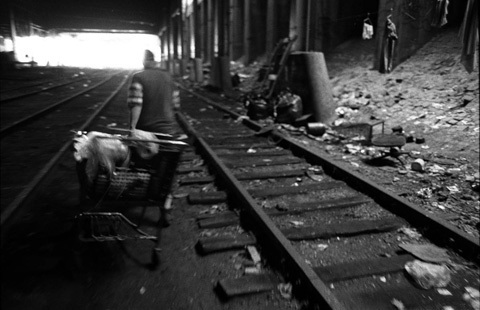Teun Voeten
(PM)

The main advantage that tunnel people have over street people is they don't have to put up with other people, although in this case they do have to put up with Amtrak trains running through their bedrooms at all hours, on their way, we are told, to Ohio.
Teun Voeten grew up in the Netherlands, and has a passion for the dispossessed. Thus, after his journalistic forays into Sierra Leone, Sudan, Rwanda, Angola, and Sierra Leone and other desperate places, in 1993 he chose to go and live for several months in New York City with the underground folk whose home extended from West 72nd Street to West 106th Street.
There he is able to observe, first hand, rats racing across his bed, people smoking crack and getting drunk on malt liquor, madmen threatening to bash him with baseball bats, bottles of old piss collected and stored by those who once occupied his bedroom, and the mountains of discarded TVs, stereos, rags, trash and dogs howling and the ever present trains going by in their hurry to get out of the city.
In this dank nook, he befriends José, Dee, Ralph, Hugo, and dozens of other tunnel people. The best of the bunch, according to Teun, is Bernard, who more or less runs the show, dealing not only with the heavies from the NYPD and the Fire Department, but the crazies and delinquents who invade his home at unexpected times, along with, according to him, the worst of all, a black lady cop from Amtrak who opined that it would be best if these tunnel people would stop sleeping on the railroad tracks because every tunnel person that got squashed delays those above-ground people who, after all, just want to get home to their condo in Cincinnati.
Teum gives the impression of not being nuts himself even though he chooses to spend two frozen months in a dark and noxious tunnel. Outside of the author, Bernard appears to be the most interesting and coherent character in the book. He is savvy and has perfected a system of collecting cans that brings in enough money to keep breakfast and dinner steaming on his hotplate and makes it possible for him to go to the laundry and even get a bath from time to time.
Bernard does have his problems, though: he carries on at length about being responsible for 20 - 30 vagrants who are usually psyched out, drunk, or stoned. In fact Bernard himself has a bit of a habit: his early evening smoke of choice, crack. One of the more interesting scenes in the book takes place because Voeten decides that if he is going to write about the tunnel people, he has to become one.
He joins Bernard on his daily journey to collect cans and the weekly trips for water, food, and supplies. When Bernard retires for his daily puff, Voeten chooses to join him: "I suck the sharp smoke deep inside my lungs and hold my breath as long as possible. After a few seconds I already feel the effect: a strange lucidity that lasts a very short time before it transforms into a laconic melancholy, mixed with a very pleasant dizziness. A few minutes later, these effects are gone, changed into a strong desire for another hit. This is what crack smokers call thirst."
Tunnel People is a Dantesque journey, albeit a lot less fun than The Divine Comedy. I wandered there for a few hours with Bernard and Teum and the others, and after awhile I felt as dead-ended as most of them. What sticks with one are not the interviews with people who, after all, have opted out of the bright lights of the upper world. Rather, it is the way that desperate people survive and even are proud of their awful surroundings.
Tunnel people are just street people who have found another venue, a venue that can be seen, and visited .... and recorded, separated out from the thousands that haunt our city parks and streets and alleys, trying just to survive.
These people can thus be classified by the writers and the media: they are the ones who live in a long, dark tunnel under the streets in one of the most prosperous areas in the world, Manhattan. And it is not only the police and the rats that have to be fended off, it's the journalists as well.
Bernard collects the calling cards of all the newspeople who have done documentaries and interviews about them. During Voeten's stay, an entire camera crew from Paris appears, spending several days stepping on garbage and broken cans and steaming piles of crap, videotaping this subset of the world of the dispossessed.
Whenever Amtrak appears on the scene, eager, understandably, to get rid of this collection of misfits who are gumming up their schedules by bedding down on the tracks, Bernard calls on his acquaintances at CNN and NBC and ABC and PBS to get the fuzz off their back ... so they can return to their pipes and cans and stinky domain there in the underworld ... certainly one as horrendous as the deepest circles of Dante's Inferno.